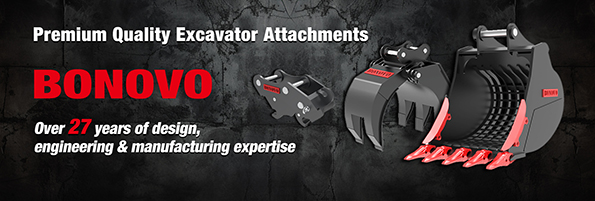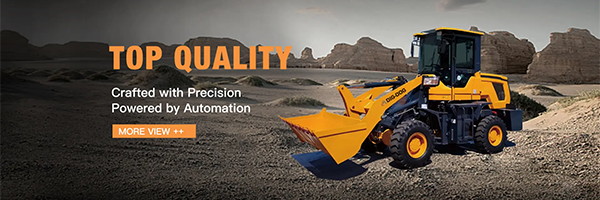As an important mechanical equipment in engineering construction, the stable operation and strong power of excavators cannot be guaranteed without scientific and reasonable maintenance. The maintenance of the two ends of the excavator, that is, the maintenance of the front-end working device of the excavator (such as bucket, boom, dipper, etc.) and the rear-end power system (engine, hydraulic system, etc.), is particularly critical. Next, we will explore in depth the methods of maintenance of the two ends from the details, and analyze the key contents in practical applications such as "the focus of maintenance of the two ends of the excavator in different seasons" and "the difference between the maintenance of the two ends of small excavators and large excavators".
Maintenance of front-end working device: ensure accurate and efficient operation
The front-end working device of the excavator is directly involved in excavation, loading and unloading and other operations, and its maintenance status directly affects the accuracy and efficiency of the operation. First of all, pay attention to the maintenance of the bucket. The bucket frequently contacts various materials in daily operations and is easily worn. Regularly check the wear of the bucket teeth. When the bucket teeth are worn by more than 85%, they should be replaced in time. Under different working conditions, the degree of wear of the bucket is different. When excavating hard rocks, the bucket teeth wear faster, and the inspection cycle needs to be shortened. At the same time, the residual materials in the bucket should be cleaned to prevent the accumulation of materials and corrosion of the bucket body.
For the boom and the dipper, the pins and bushings at the connection parts need to be checked. During the working process, the pins and bushings will be worn due to frequent force, resulting in increased clearance and affecting the operation accuracy. Lubricate the pins and bushings regularly, and use high-temperature and high-pressure resistant high-quality grease, and refill them according to the prescribed maintenance cycle. In terms of "maintenance focus of the two ends of the excavator in different seasons", when the temperature is high in summer, the fluidity of the grease increases, and the filling frequency needs to be appropriately increased; when the temperature is low in winter, grease with good low-temperature performance should be selected to ensure the lubrication effect. In addition, check whether there are signs of cracking in the welds of the boom and the dipper. If found, they should be repaired in time to avoid safety accidents caused by structural damage.
Maintenance of the rear-end power system: providing continuous strong power
The rear-end power system is the "heart" of the excavator, and good maintenance is the key to ensuring the continuous strong power of the equipment. As a power source, the engine is essential for maintenance. Regularly replace the engine oil and oil filter. The engine oil can lubricate, cool and clean the internal parts of the engine. After long-term use, the engine oil will deteriorate and the filter will be clogged, affecting the engine performance.
Under normal circumstances, the engine oil and filter should be replaced every 8 hours of work or according to the instructions. The choice of engine oil varies in different seasons. In summer, you can use oil with a slightly higher viscosity to ensure the lubrication effect at high temperatures; in winter, you need to use oil with good low-temperature fluidity to facilitate engine starting. This is exactly the embodiment of "maintenance focus of excavators at both ends in different seasons" in engine maintenance.
The hydraulic system is also an important part of the back-end power system. Maintaining the cleanliness of the hydraulic oil is the core of hydraulic system maintenance. Impurities in the hydraulic oil will aggravate the wear of hydraulic pumps, valves and other components, and reduce system efficiency. Regularly check the oil quality and oil quantity of the hydraulic oil. When the oil quality deteriorates or the oil quantity is insufficient, replace or replenish it in time. At the same time, clean the hydraulic oil tank and filter to prevent impurities from entering the system. For small excavators and large excavators, there are certain differences in maintenance due to the different power and working pressure of their hydraulic systems. The hydraulic system of a large excavator has a large flow and high pressure, and has higher requirements for the quality and cleanliness of the hydraulic oil, and the maintenance cycle may be relatively shorter; the hydraulic system of a small excavator is relatively simple, but daily maintenance cannot be ignored. Maintenance work should be reasonably arranged according to its specific working conditions. This is the embodiment of the "difference in maintenance between small excavators and large excavators" in hydraulic system maintenance.
Daily inspection and special situation handling: all-round guarantee of equipment status
In addition to targeted maintenance of the front-end working device and the rear-end power system, daily inspection is also indispensable. Before working every day, the excavator should be fully inspected, including whether the appearance is damaged, whether the instruments are normal, and whether the lights are complete. Check the tension of the crawler. Too loose or too tight will affect the walking performance and crawler life of the excavator. During the operation, pay attention to the sound of the engine and hydraulic system. If there is an abnormal noise, stop the machine immediately for inspection, determine the cause of the fault and deal with it in time.
When encountering special circumstances, such as long-term operation in harsh environments (such as high temperature, high humidity, dust, etc.), it is necessary to strengthen the maintenance of the excavator. In a dusty environment, the frequency of air filter replacement should be increased to prevent dust from entering the engine; in a high temperature environment, attention should be paid to the heat dissipation of the engine, and check whether the water tank coolant is sufficient and whether the cooling fan is operating normally. For special circumstances in different seasons, such as low temperatures in winter, cold and warm measures should be taken. Insulation sleeves can be added to the engine to prevent coolant from freezing and damaging the engine; in high temperatures in summer, the hydraulic system oil temperature should be prevented from being too high. The operating intensity can be appropriately reduced and the heat dissipation time can be increased.
Maintenance of both ends of the excavator From the front-end working device to the rear-end power system, every detail is related to the performance and life of the equipment. By paying attention to the actual points such as "the focus of maintenance of both ends of the excavator in different seasons" and "the difference between the maintenance of both ends of small excavators and large excavators", doing a good job of daily inspection and handling of special situations can fully guarantee the strong power and stable operation of the excavator, and provide solid guarantee for the smooth progress of engineering construction.
Maintenance of both ends of the excavator: starting from the details to ensure strong power of the equipment
- DIG-DOG
- Counselor
- Posts: 645
- Joined: Oct 20th, '24, 22:38
- Location: China
Maintenance of both ends of the excavator: starting from the details to ensure strong power of the equipment
Choose DIG-DOG for high-quality, customizable brush cutters for skid steers with fast delivery. Contact us today to discover how our superior products can enhance your land management tasks!
for more info just visit our website at WWW.DIG-DOG.COM
contact # : +86 158 6218 2088
email : sales@bonovogroup.com
for more info just visit our website at WWW.DIG-DOG.COM
contact # : +86 158 6218 2088
email : sales@bonovogroup.com

